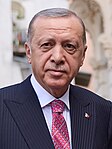
Back الانتخابات الرئاسية التركية 2023 Arabic Türkiyədə prezident seçkiləri (2023) Azerbaijani Президентски избори в Турция (2023) Bulgarian তুরস্কের রাষ্ট্রপতি নির্বাচন, ২০২৩ Bengali/Bangla ھەڵبژاردنی سەرۆکایەتیی تورکیا (٢٠٢٣) CKB Präsidentschaftswahl in der Türkei 2023 German Τουρκικές προεδρικές εκλογές (2023) Greek Elecciones presidenciales de Turquía de 2023 Spanish انتخابات ۲۰۲۳ ترکیه Persian Turkin presidentinvaalit 2023 Finnish
| |||||||||||||||||||
| Opinion polls | |||||||||||||||||||
| Turnout |
| ||||||||||||||||||
|---|---|---|---|---|---|---|---|---|---|---|---|---|---|---|---|---|---|---|---|
| |||||||||||||||||||
| |||||||||||||||||||
Presidential elections were held in Turkey in May 2023, alongside parliamentary elections, to elect a president for a term of five years.[1] Dubbed the most important election of 2023,[2][3] the presidential election went to a run-off for the first time in Turkish history.[4] The election had originally been scheduled to take place on 18 June, but the government moved them forward by a month to avoid coinciding with the university exams, the Hajj pilgrimage and the start of the summer holidays.[5] It is estimated that a total of 64 million voters had the right to cast their votes in elections, 60.9 million in Turkey and 3.2 million abroad.[6]
Incumbent president Recep Tayyip Erdoğan of the Justice and Development Party (AK Party) ran for re-election as the joint candidate of the People's Alliance, which includes the Nationalist Movement Party (MHP) and two other smaller parties. The Nation Alliance, composed of six opposition parties including the main opposition Republican People's Party (CHP), fielded CHP leader Kemal Kılıçdaroğlu as its presidential candidate. Though not part of the alliance, the pro-Kurdish Party of Greens and the Left Future (YSGP) and the Labour and Freedom Alliance (of which it is a member) endorsed Kılıçdaroğlu.[7] Two other minor candidates, namely Homeland Party leader Muharrem İnce and anti-immigration ultranationalist Ancestral Alliance nominee Sinan Oğan, also reached the required 100,000 signatures to stand; however, three days before the election, İnce withdrew from the election citing consistent slander and smear campaigns against him by rival candidates, though he still appeared on ballots.[8]
The main campaign issues revolved around the deadly February 2023 Turkey–Syria earthquake, which left over 50,000 people dead and threatened to postpone the election date.[9][10] The government was criticised by opposition politicians for its slow response to the earthquake and land amnesties prior to it that critics claimed left buildings more vulnerable.[11] The economy also featured prominently due to the rapidly rising cost of living. In most polls, voters identified the economy as their prime area of concern.[12]
In the first round Erdoğan and Oğan outperformed expectations to receive 49.5% and 5.2% of the vote respectively, while Kılıçdaroğlu received 44.9% and Muharrem İnce (who remained on the ballot despite withdrawing) 0.4%. As Erdoğan's vote share was 0.5% short of winning outright, he and Kılıçdaroğlu contested a run-off vote on 28 May. Oğan endorsed Erdoğan, while the elements of Ancestral Alliance split their support, as Victory Party leader Ümit Özdağ endorsed Kılıçdaroğlu and My Country Party leader Neşet Doğan endorsed Erdoğan.[13][14] Erdoğan would be re-elected to a third term with 52.2% of the vote in the runoff.
This was incumbent President's Recep Tayyip Erdoğan's eleventh election victory in a row going back to his election as Mayor of Istanbul in 1994. His victory was seen as a continuation of his nearly three-decades dominance over Turkish politics. In contrast, following Kılıçdaroğlu's narrow defeat, he was voted out as the leader of the CHP in November.[15][16][17]
- ^ "Factbox: Turkey elections 2023: what you need to know". Reuters. 14 May 2023. Archived from the original on 20 May 2023. Retrieved 19 May 2023.
- ^ Ghosh, Bobby (10 January 2023). "The World's Most Important Election in 2023 Will Be in Turkey". Washington Post. Retrieved 17 September 2023.
- ^ Stamouli, Nektaria (17 April 2023). "2023's most important election: Turkey". POLITICO. Retrieved 17 September 2023.
- ^ "Turkey's presidential election goes to run-off: Election council". www.aljazeera.com. 15 May 2023. Archived from the original on 19 May 2023. Retrieved 19 May 2023.
- ^ "Erdogan calls Turkish elections for May 14, three months after quake disaster". Reuters. 10 March 2023. Archived from the original on 4 May 2023. Retrieved 19 May 2023.
- ^ Arolat, Osman (4 May 2023). "Seçimde en büyük etken Z kuşağı ve kadınlar…". Ekonomim (in Turkish). Archived from the original on 5 April 2023. Retrieved 29 April 2023.
- ^ "Emek ve Özgürlük İttifakı'ndan Kılıçdaroğlu'na destek". dw.com (in Turkish). Archived from the original on 11 May 2023. Retrieved 13 May 2023.
- ^ Ebrahim, Isil; Sariyuce, Gul; Tuysuz, Nadeen (11 May 2023). "Turkish presidential candidate withdraws in potential boost for Erdogan rival". CNN. Archived from the original on 11 May 2023. Retrieved 11 May 2023.
- ^ Buyuk, Hamdi Firat (14 February 2023). "Erdogan Ally Calls for Turkish Election Postponement After Quake". Balkan Insight. Archived from the original on 19 March 2023. Retrieved 5 March 2023.
- ^ "How Will Turkey's Earthquake Affect the Current Election Cycle?". The Washington Institute. Archived from the original on 3 April 2023. Retrieved 5 March 2023.
- ^ "Erdoğan says sorry for earthquake rescue delays". POLITICO. 27 February 2023. Archived from the original on 11 May 2023. Retrieved 13 May 2023.
- ^ "En büyük sorun ekonomi". birgun.net (in Turkish). Archived from the original on 11 May 2023. Retrieved 13 May 2023.
- ^ "Ülkem Partisi Genel Başkanı Doğan'dan Cumhurbaşkanı Erdoğan'a destek açıklaması". Habertürk (in Turkish). Retrieved 7 October 2023.
- ^ "Turkey election: What five more years of Erdogan would mean". BBC News. 26 May 2023. Archived from the original on 26 May 2023. Retrieved 26 May 2023.
- ^ Ethan (29 May 2023). "Erdoğan wins his 11th election in a row". International Intrigue.
- ^ Fatma Tanis (29 May 2023). "Erdogan's victory could be fateful for Turkey's democracy and role in the world". NPR.
- ^ Adam Samson (5 November 2023). "Turkey's opposition ousts longtime leader after general election defeat".



